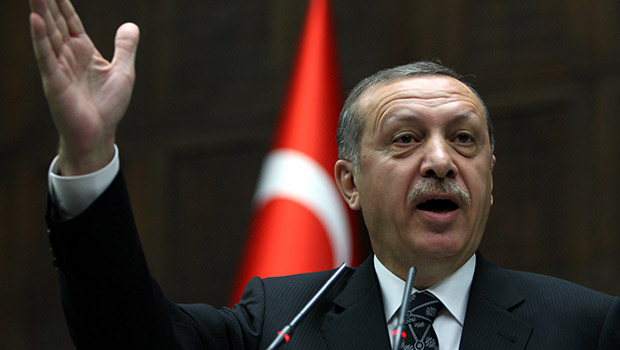
File photo—Turkish Prime Minister Recep Tayyip Erdogan addresses on April 16, 2013 members of his ruling Justice and Development Party (AKP) at the Turkish Parliament in Ankara. (AFP PHOTO / ADEM ALTAN)
The expiration of the original mandate came at a time when the possibility of a US-led military intervention in Syria was fast-fading from the agenda of international powers. Turkey is one of Assad’s fiercest critics, and has advocated military intervention in Syria. The ruling Justice and Development Party (AKP) has grown frustrated over what it sees as Western indecisiveness. It is therefore unsurprising that Turkish prime minister, Recep Tayyip Erdoğan, was quick to extend the mandate for another year as soon as he returned from the government’s summer recess last week.
Shortly after the Turkish parliament approved the mandate Erdoğan criticized US Secretary of State John Kerry for praising the government of Syrian President Bashar Al-Assad for its efforts to commence the destruction of its chemical weapons. Erdoğan called Assad “a terrorist who has killed 110,000 of his own people.”
The mandate detailed a grim picture of the situation in Syria, noting that millions of Syrians have been displaced by the war and that Turkey faces an even greater influx of refugees from across the border—Turkey is currently home to over 500,000 Syrian refugees. The motion also noted that the number of Turkish citizens who have lost their lives in attacks originating from Syria has reached seventy-one.
However, the mandate did not mention the other issues currently worrying Erdoğan’s government. Among its principal concerns is the threat of terrorism along its porous border. Extremist groups have set up camp along the border after capturing several northern Syrian towns. Smugglers, sometimes charging on horseback, regularly open fire on Turkish security units when blocked from entering into the country illegally.
The Al-Qaeda-linked Islamic State of Iraq and the Levant (ISIL) has threatened Turkish Prime Minister Recep Tayyip Erdoğan with a series of “suicide attacks” in Istanbul and Ankara and demanded that Turkey reopen the Bab Al-Hawa and Bab Al-Salameh crossing points, which authorities closed after ISIL seized control of the Syrian town of Azaz.
With Turkey now worried about smuggling groups and Al-Qaeda affiliated organizations, the mandate is more likely to act as a method of self-preservation rather than facilitate an all out military attack. Erdoğan is best off containing the current chaos on the border rather than starting up a new confrontation.
